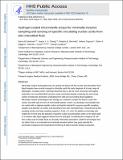| dc.contributor.author | Al Sulaiman, Dana | |
| dc.contributor.author | Chang, Jason Y. H. | |
| dc.contributor.author | Bennett, Nitasha R. | |
| dc.contributor.author | Topouzi, Helena | |
| dc.contributor.author | Higgins, Claire A. | |
| dc.contributor.author | Irvine, Darrell J. | |
| dc.contributor.author | Ladame, Sylvain | |
| dc.date.accessioned | 2020-04-24T17:47:12Z | |
| dc.date.available | 2020-04-24T17:47:12Z | |
| dc.date.issued | 2019-08 | |
| dc.date.submitted | 2019-06 | |
| dc.identifier.issn | 1936-086X | |
| dc.identifier.issn | 1936-0851 | |
| dc.identifier.uri | https://hdl.handle.net/1721.1/124859 | |
| dc.description.abstract | Minimally invasive technologies that can sample and detect cell-free nucleic acid biomarkers from liquid biopsies have recently emerged as clinically useful for early diagnosis of a broad range of pathologies, including cancer. Although blood has so far been the most commonly interrogated bodily fluid, skin interstitial fluid has been mostly overlooked despite containing the same broad variety of molecular biomarkers originating from cells and surrounding blood capillaries. Emerging technologies to sample this fluid in a pain-free and minimally-invasive manner often take the form of microneedle patches. Herein, we developed microneedles that are coated with an alginate-peptide nucleic acid hybrid material for sequence-specific sampling, isolation, and detection of nucleic acid biomarkers from skin interstitial fluid. Characterized by fast sampling kinetics and large sampling capacity (â6.5 μL in 2 min), this platform technology also enables the detection of specific nucleic acid biomarkers either on the patch itself or in solution after light-triggered release from the hydrogel. Considering the emergence of cell-free nucleic acids in bodily fluids as clinically informative biomarkers, platform technologies that can detect them in an automated and minimally invasive fashion have great potential for personalized diagnosis and longitudinal monitoring of patient-specific disease progression. Keywords: microneedle; hydrogel; skin interstitial fluid; microRNA; biomarker | en_US |
| dc.description.sponsorship | David H. Koch Institute for Integrative Cancer Research at MIT (S. Leslie Misrock Frontier Research Fund for Cancer Nanotechnology) | en_US |
| dc.description.sponsorship | Imperial College, London (Scholarship) | en_US |
| dc.description.sponsorship | Cancer Research UK (Grant C49996/A26141) | en_US |
| dc.language.iso | en | |
| dc.publisher | American Chemical Society (ACS) | en_US |
| dc.relation.isversionof | http://dx.doi.org/10.1021/ACSNANO.9B04783 | en_US |
| dc.rights | Article is made available in accordance with the publisher's policy and may be subject to US copyright law. Please refer to the publisher's site for terms of use. | en_US |
| dc.source | PMC | en_US |
| dc.title | Hydrogel-Coated Microneedle Arrays for Minimally Invasive Sampling and Sensing of Specific Circulating Nucleic Acids from Skin Interstitial Fluid | en_US |
| dc.type | Article | en_US |
| dc.identifier.citation | Al Sulaiman, Dana, et al. “Hydrogel-Coated Microneedle Arrays for Minimally Invasive Sampling and Sensing of Specific Circulating Nucleic Acids from Skin Interstitial Fluid.” ACS Nano 13, 8 (August 2019): 9620–28. | en_US |
| dc.contributor.department | Massachusetts Institute of Technology. Department of Materials Science and Engineering | en_US |
| dc.contributor.department | Massachusetts Institute of Technology. Department of Biological Engineering | en_US |
| dc.contributor.department | Ragon Institute of MGH, MIT and Harvard | en_US |
| dc.contributor.department | Koch Institute for Integrative Cancer Research at MIT | en_US |
| dc.relation.journal | ACS Nano | en_US |
| dc.eprint.version | Author's final manuscript | en_US |
| dc.type.uri | http://purl.org/eprint/type/JournalArticle | en_US |
| eprint.status | http://purl.org/eprint/status/PeerReviewed | en_US |
| dc.date.updated | 2020-03-09T19:00:47Z | |
| dspace.date.submission | 2020-03-09T19:00:50Z | |
| mit.journal.volume | 13 | en_US |
| mit.journal.issue | 8 | en_US |
| mit.license | PUBLISHER_POLICY | |
| mit.metadata.status | Complete | |
